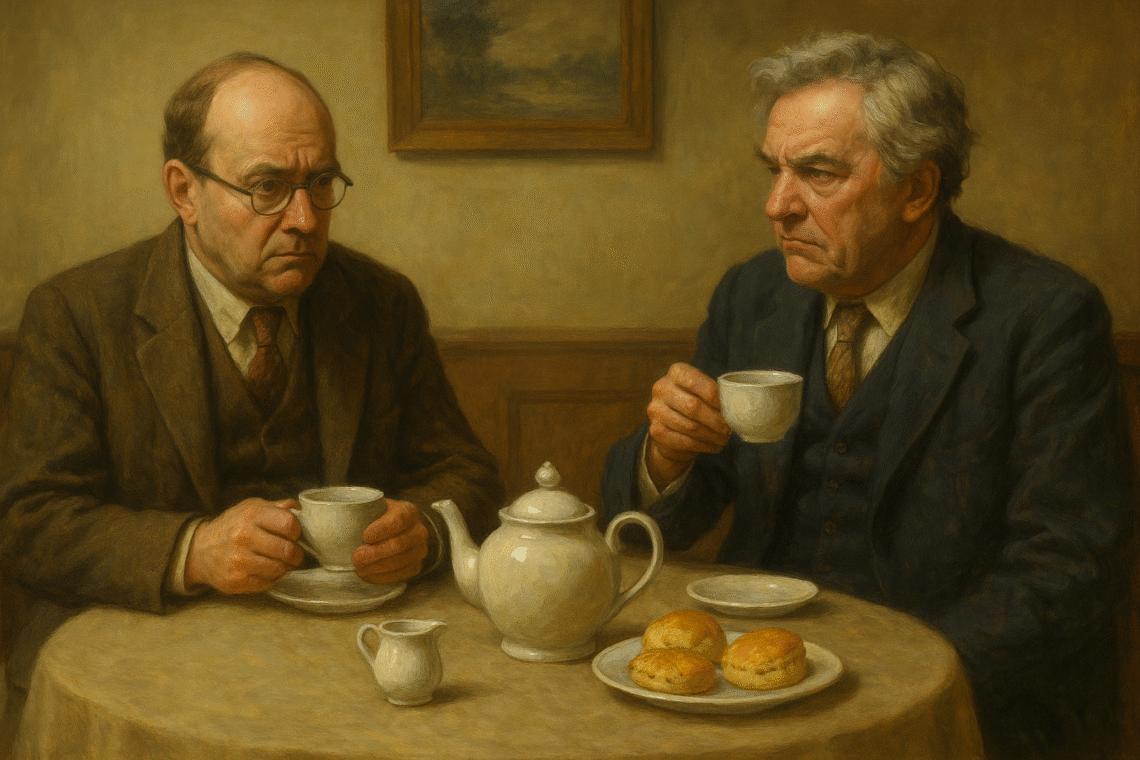On living with the people we disagree with
There are few things in life more civilised,or more spiritually instructive,than the act of making tea for someone with whom one profoundly disagrees.
I say this as one who has, on more than one occasion, poured Earl Grey for someone whose political views made me question whether we were even living on the same planet. There we sat, in my slightly overgrown parlour, he in a garish necktie, I in my usual tweed, and between us, a teapot. Hot, steaming, utterly indifferent to our opposing worldviews.
That pot of tea, dear friend, did more to preserve the fragile bonds of our society than any number of parliamentary sessions or performative op-eds. Because in that moment, we both acknowledged something older and deeper than ideology: the quiet, noble act of staying in relationship, even when one wants to run screaming into the hedgerow.
Now, I will not pretend that tolerance is easy. The word itself has fallen out of fashion in some quarters,branded as too thin, too passive, too much like the limp handshake of a vicar who’s lost his faith. But I rather like it. It is an old virtue. And like all true virtues, it demands something of us.
To tolerate is not to agree. It is not to condone. It is not even, always, to enjoy. It is to accept the presence of another,fully, stubbornly themselves,and to remain seated, heart open, kettle warm.
This is the daily miracle of any free society: people who cannot understand one another still managing to share roads, schools, markets, and yes, tea tables. And if that does not strike you as remarkable, then you have not recently tried to organise a community meeting on recycling bins.
Freedom, you see, is not forged in isolation. It is proved in proximity. The true test of a people’s liberty is not how fiercely they defend their opinions, but how gently they hold space for dissent.
I am reminded of a line from the ever-perceptive G.K. Chesterton, who quipped, “The Bible tells us to love our neighbours, and also to love our enemies; probably because they are generally the same people.” Quite.
It is easy,comforting, even,to surround ourselves with those who think as we do. Social media all but insists upon it, offering us the narcotic pleasure of curated agreement. Algorithms usher us into echo chambers where we can safely rage without interruption. And yet, something vital is lost in this filtered existence. The rough edges of human difference, which once sharpened our minds and widened our compassion, are now filed down to comfortable sameness.
But here’s the rub: a truly free society must make room for the awkward conversation, the unpopular opinion, the neighbour whose garden gnome collection you quietly loathe. Not because these things are agreeable, but because they are human. And freedom, at its heart, is not a technical arrangement of laws and rights, but a lived commitment to the dignity of the other.
I once heard a rabbi say that the greatest gift you can give someone is the willingness to be puzzled by them. Not to correct them, convert them, or cancel them,but simply to be puzzled. To hold your bafflement tenderly, like a stone worn smooth by time, and say, “You are not me. And that is all right.”
That is the spirit of the teapot. It does not interrogate before it pours. It does not check party affiliation before steeping. It simply warms, and waits, and invites.
If this sounds naive, so be it. I have lived long enough to know that not all disagreements can be bridged. Some will remain, like certain cheeses, delightfully or offensively pungent depending on one’s palate. But even then, one can choose respect. One can choose presence. One can, at the very least, pour the tea.
And here’s the quiet miracle: when we stay at the table, something softens. Perhaps not the argument. But something in us. The great noise of the world is hushed for a moment, and we remember that the person before us is more than their opinions. They are, like us, full of hidden sorrows, secret joys, and the unspoken hope of being understood.
So I shall continue to make tea,for the agreeable and the maddening, for the like-minded and the bewildering. Because I believe that the strength of a free society lies not in unanimity, but in shared hospitality. In the courage to stay in the room.
Even when the jam is on the wrong side of the scone.





